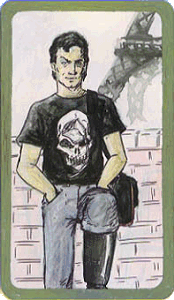 Messages Found in Bottles...
Messages Found in Bottles... Messages Found in Bottles...
Messages Found in Bottles...In which Ramon writes to his old benefactor and the first relative he ever met, who happens to be dead dead dead.
Dear Brand,
A friend of mine once wrote about "the nothing that is not there and the nothing that is." The best information I have is that you now reside at the bottom of the latter. So when I finish this note I will tuck it in an empty bottle of Ki-Rin, stand at what we insist on calling "the edge" of the Abyss on the lip of Chaos (Chaos - imagine it!), and launch it in
your direction. This action is, of course, absurd, but I was once a French intellectual and we were all, as one says nowadays, into that. (I still remember the night, early in our acquaintance, when you offered to "prove to me once and for all" that essence precedes existence. Thus began, in "L'Ecole de Tir na Nog'th," my study of Applied Philosophy.) But enough Preamble, however much retro cachet it has now, and however much you always preferred a good windup before your own pitch. I write because I must , and no one alive who would have more interest in what I have to say than you have dead.
On your advice, I never contacted the man you told me was my father, Corwin of Amber. And I stayed away from Amber itself for the first five "years" I didn't hear from you. I traveled in shadow and painted trumps. I tried to use trump to help a friend of mine through a bad patch. His name was Phil Dick and he was a writer with the erratic life skills common to the breed. I basically moved into his body for awhile and did some things to set his affairs in order. Out of his misinterpretations of the experience came a crackpot gnosticism and three very good books - I suppose on balance I did a good thing. He died while I was traveling in shadow.
While I was traveling in shadow, shadow went away. I understand this was your doing. Which means, I suppose, that I lost all those fine debates we used to have, but then who wants to listen to some provincial who thought that existence preceded essence? There was a rainstorm. It fairly screamed "Run away," so I did. Only not successfully. Among the many questions I wish you could answer, the first is probably not "Why?" but "How much is being in the Abyss (to the extent there is being in the Abyss) like getting caught in the black rain?" About the black rain, I can usefully say little, except that I may have felt less like the nothing that is not there or the nothing that is than like "the is that was nothing." Did clutching my own trump help, like you taught me? I think so.
When it lifted, and I was again, and everything else was too, it was like a day with a steady breeze, and it's when the breeze picks up that you realize that the air had been momentarily becalmed. So I decided the time had come to find Amber. The storm had come from its "direction," it had been five years and more since I'd had any sign of you, and I was finally curious: your descriptions had, frankly, never made that particular pseudo-medieval kingdom sound too compelling, and a lot of the "one true realm" routine I classed with the declarations of Russians who claim their country invented baseball or Canadians who insist that their brand of football is the real game, and the American variant a poor imitation. I still feel this way most of the time. But some knowledge of Amber now seemed entirely practical.
I knew the city before I knew the castle, and the port first of all. I shipped in and out of shadow on traders, collected gossip, and kept the lowest of low profiles for a couple of years. You had warned me what a snake pit the royal family was, and I hadn't survived the Terror, the Paris Commune, the Spanish Civil War and the Vichy Civil Service without learning caution. Who was up, down, in, out? The answers stabilized at Random, You, Gerard and Flora, and Bleys and Fiona. Corwin was "out" in a way - he and his son(!) had set off to find "his" pattern. Ah Brand, if The Pattern was the source of all existence, why were there so many of them? Unlike you, I never had any family or a sense of family that was other than anthropological, so I felt little interest in Corwin as my father. But I had tremendous interest in his Pattern.
Finding it meant introducing myself to your family, which is, in some abstract way, my own. And they seem out to be rather nicer than you gave me to think. But more about that in another letter.
Best,
Ramon